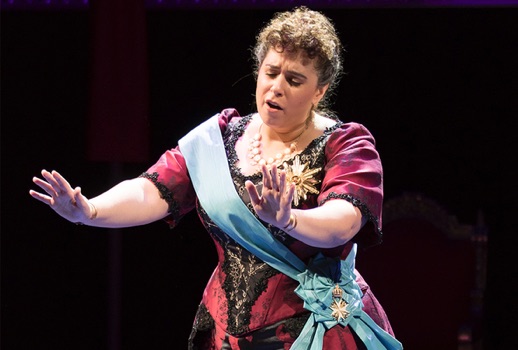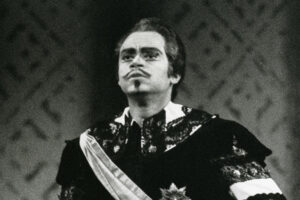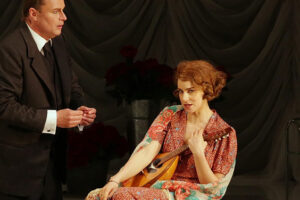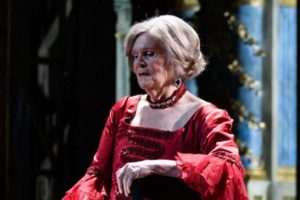

Offering something slightly more substantial than the 20-minute pieces shown last month, WNO premiered Better Gods, an hour-long work by composer Luna Pearl Woolf and librettist Caitlin Vincent on Friday evening. The subject is the fate of Queen Lili’uokalani, last monarch of Hawaii. In 1898, Lili’uokalani attempts to repudiate the U.S.-friendly constitution inherited from her predecessor and shore up Hawaiian sovereignty.
A cabal of American businessmen is not having it, and, calling in the Marines, easily seizes power in a bloodless coup. Later, on the pretext of a weapons cache discovered in the hands of remaining rebel forces, they try Lili’uokalani on trumped up charges of treason and extract her abdication. Subsequently imprisoned, the takeover sets the stage for Hawaii’s incorporation as an American territory and later statehood.
Wolff’s music sets a bleak and mournful tone for this tragic little story of brazen colonial prerogative. Incorporating Hawaiian chant, traditional percussion instruments, snippets of period Americana, and motifs from well-known songs written by Lili’uokalani herself, there is a lot to appreciate, if not always immediately enjoy, in the varied textures Woolf spins.
Vocal ensembles, particularly the prologue and frenzied final courtroom scene, are some of the most exciting music in the score, as is the soaring writing reserved for Lili’uokalani. Dramatic exchanges can be less effective, returning repeatedly to a meandering bluster that drifts toward sameness.
Vincent’s libretto is efficient, perhaps too efficient at times, parsing out the story in a series of tidy scenes tracing Lili’uokalani’s betrayal and downfall. As historically-themed opera libretti go, this is definitely more focused stuff than the throw-a-dart-at-a-syllabus example set by Appomattox earlier this season.
Still, this premiere version of Better Gods spends a lot of time trying to pack in a wealth of key themes and plot points through paint-by-numbers dialogue, at the expense of building dramatic interest. When the libretto indulges in more inventive, character-driven material the piece comes alive, but, given the slender running time, the overall impression leans toward the educational.
Trading in those pizza shirts for outfits with a little more gravitas, many of the Cafritz-Domingo young artists appearing in the earlier American Opera Initiative evening returned to the cast here. Mezzo Daryl Freedman, who will join the Walküre schwestern in a few months, confidently led the show in the demanding role of the Queen. Digging into Lili’uokalani’s solo music with abandon, she easily filled the Terrace Theater with a big secure top, while credibly dipping into alto territory in a series of striking low-lying passages.
Elsewhere in the cast, Rexford Tester lent his light, pleasing tenor to American usurper-in-charge, Lorrin Thurston. Hunter Enoch did the honors as requisite “nice white guy” foil to Tester’s mustache-twirling colonialist, bringing a warm, expressive baritone to the role of a journalist who comes to appreciate the plight of Lili’uokalani and her subjects. Basses Timothy J. Bruno and Wei Wu ably rounded out the male principals as an American judge and the leader of the Hawaiian rebellion, respectively, while Ariana Wehr’s soprano added distinctive color to many of the ensembles in the role of Kahua.
The Terrace can be a tough room for fully realized theater, but director Ethan McSweeney and designer Daniel Conway made elegant work of the space. The dark, attractive set punctuated by brilliant bursts of color captured the frequent night imagery in the text while evoking the colors of the islands, and tableaux such as the raising of the American flag over the final bars of the opera managed to be spare but effective.
Photo: Scott Suchman
























Comments